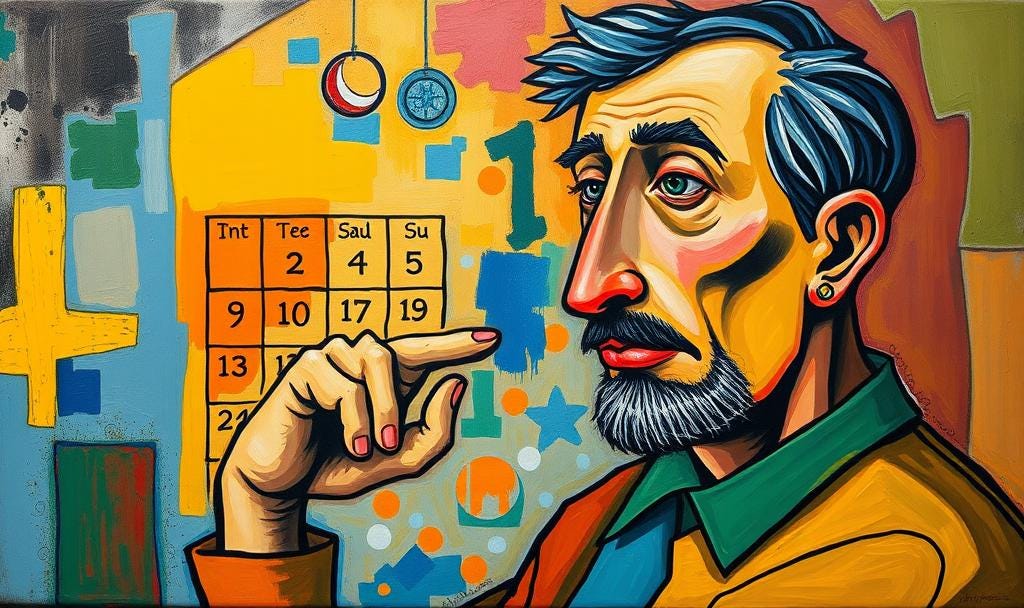Your Subconscious Has a Calendar. And, It’s Ruining Your Productivity
My honest look at why we skip tasks, miss deadlines, and feel stuck.
I thought my productivity system was bulletproof.
Every Sunday, like clockwork, I’d open Todoist, review my priorities, color-code my Google Calendar, and slot deep work sessions into my power hours.
It looked great.
Then Monday hit—and half the tasks either slipped, got delayed, or felt like a chore. Even during my high-energy windows, I’d catch myself opening YouTube or responding to low-priority emails. It felt like my calendar and my brain were in different zip codes.
It took me a long time to realize: something else was running the show.
And it wasn’t my productivity app.
The Invisible Calendar Running in the Background
Here’s the unsettling truth:
You may have a stunning, color-coded digital calendar—but your real “schedule” is being run by something else entirely: your subconscious.
Psychologists have long known that our subconscious mind influences more than 90% of our decision-making (Kahneman, 2011).
But here’s what’s rarely discussed: your subconscious has its calendar.
Let me explain.
If you avoid writing every Monday morning, even though you blocked time for it, chances are your mind associates writing with a memory—maybe a time you were judged, humiliated, or felt “not good enough.”
Your resistance isn’t laziness. It’s self-protection.
If you always start projects at 10 PM, your body might be chasing the rush of “productive guilt” tied to past experiences—like cramming during college or surviving in a high-pressure household where rest meant failure.
Your current habits are echoing your emotional past.
Your Inner Calendar Has Appointments You Didn’t Book
Every task you skip, every energy dip, every day you “don’t feel like it” is a data point.
But not the kind tracked in Notion. It’s a message from your hidden calendar.
This hidden calendar gets filled by:
Emotional residues: unresolved arguments, people-pleasing patterns, or guilt over resting
Somatic memories: your body remembers stress when opening a specific tab or entering a specific room
Micro-traumas: not capital-T trauma, but things like being mocked in meetings or constantly being interrupted when speaking
These don’t show up on your calendar—but they shape it.
Case Study: The 11:17 PM Habit
One of my coaching clients—let’s call her Stephanie—always did her best writing at exactly 11:17 PM.
She thought she was just a night owl.
But when we dug deeper, we found her earliest memory of uninterrupted flow came from late-night journaling during her emotionally volatile teenage years. That was the only time no one criticized her or interrupted her.
She wasn’t chasing “night owl creativity.” She was chasing emotional safety.
Once she recognized this, she slowly recreated similar psychological safety at 10 AM—with noise-canceling headphones, journaling, and a “no interruptions” agreement with her team.
Within a month, she was writing award-winning proposals during working hours.
This part is only for paid subscribers (high value)
If you’ve ever felt like your productivity system was perfect on paper but crumbled in practice—this next part is for you.
Behind the paywall, I’ll walk you through:
How I built a productivity system aligned with my emotional patterns
Real-world stories from coaching clients who uncovered their “emotional time traps”
A first look at my upcoming Subconscious Calendar Toolkit
Guided journaling prompts to help you rewrite your inner schedule
If you’re a paid subscriber—welcome in. If not, consider joining us. It supports my work and unlocks the kind of content that algorithms will never serve you.
Keep reading with a 7-day free trial
Subscribe to Revitalize Your Productivity Mojo to keep reading this post and get 7 days of free access to the full post archives.



